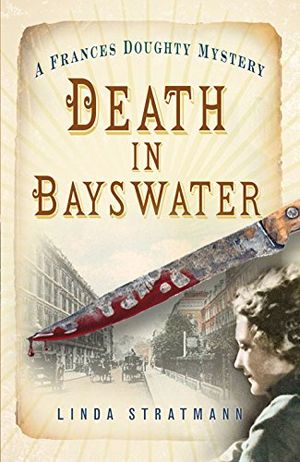
The Frances Doughty mysteries are no stranger to Crime Fiction Lover. Back in December 2014, we reviewed An Appetite for Murder, and our radar also picked up the fifth book in the series, The Children of Silence last May. Death in Bayswater finds London’s only female detective trying very hard not to join the hunt for a serial killer.
The year is 1881. Two young women have been brutally murdered in the streets of Bayswater, and Inspector Sharrock of Paddington Green is quietly congratulating himself for cracking the case without the interference of a certain young lady detective. With a conviction secured for the first death and a second suspect consigned to the insane asylum for the second, both the public and the police have been lulled into a false sense of security. The discovery of a third victim sends the citizens of West London into a state of panic.
Meanwhile, Frances and her able assistant Sarah are determined to stay well away from the investigation, which the local press are increasingly keen for her to join. Instead she has various other matters to keep her occupied. They include the sudden marriage of her solicitor’s former clerk, the decidedly creepy Mr Wheelock, to a recently widowed and incredibly wealthy elderly lady.
But Jim Price is only three weeks away from execution, convicted of killing his sweetheart, Martha Miller. It’s a murder he is adamant he did not commit. His only alibi is a man whom Prices says he helped on the night Martha was murdered only streets away. The man failed to come forward when the case was committed for trial. Jim’s desperate family approach Frances as their only hope in saving him from the hangman’s noose. Reluctant as she is to become embroiled in the hunt for the Bayswater face slasher, as the press have named him, Frances finds herself accepting the commission providing it is solely to prove Jim’s innocence.
During the course of her investigation Frances will have her own life threatened, face losses that are too close for comfort, and make several discoveries regarding her own mother’s disappearance when she was a child. The latter is a recurring theme throughout the series.
Frances is a character with a great deal of maturity for all her youth. At 21, she is well aware that society expects her to marry rather than engage in activities that she is repeatedly told are unsuitable for a young woman. She is determined not to let any disadvantages hold her back, and sensible enough not to take unnecessary risks. She is supported by her assistant, Sarah, who provides a strong right hook when the need arises, and a team of young street urchins reminiscent of Sherlock Holmes’ Baker Street Irregulars.
As with the earlier books, this is a novel with several seemingly unrelated threads running through it, which Stratmann uses to draw you deeper into the story before neatly tying them up at the end. However, she does leave one thread unresolved, that of the circumstances behind Frances’ mother’s departure several years earlier and possible doubts about her own paternity, which hint at a future investigation.
Fans of Linda Stratmann’s earlier books in this series will not be disappointed. Death in Bayswater is full of unexpected twists, turns and a shocking resolution that you certainly won’t see coming. In some ways it’s a much darker read as you can’t help drawing comparisons with the Jack the Ripper murders of 1888. The killings are sudden, vicious and each victim has been disfigured, but the only tie between them is that they’re all respectable young women who walked into the path of a killer who seems able to confidently walk the streets undetected.
Other similar books that may be of interest include, Kate Williams’ debut novel, The Pleasures of Men and Sarah Pinborough’s Mayhem. If you enjoy historical mysteries featuring female detectives, then Janet Lawrence’s Ursula Grandison novels are certainly worth investigating.
The Mystery Press
Print/Kindle/iBook
£6.02
CFL Rating: 4 Stars









